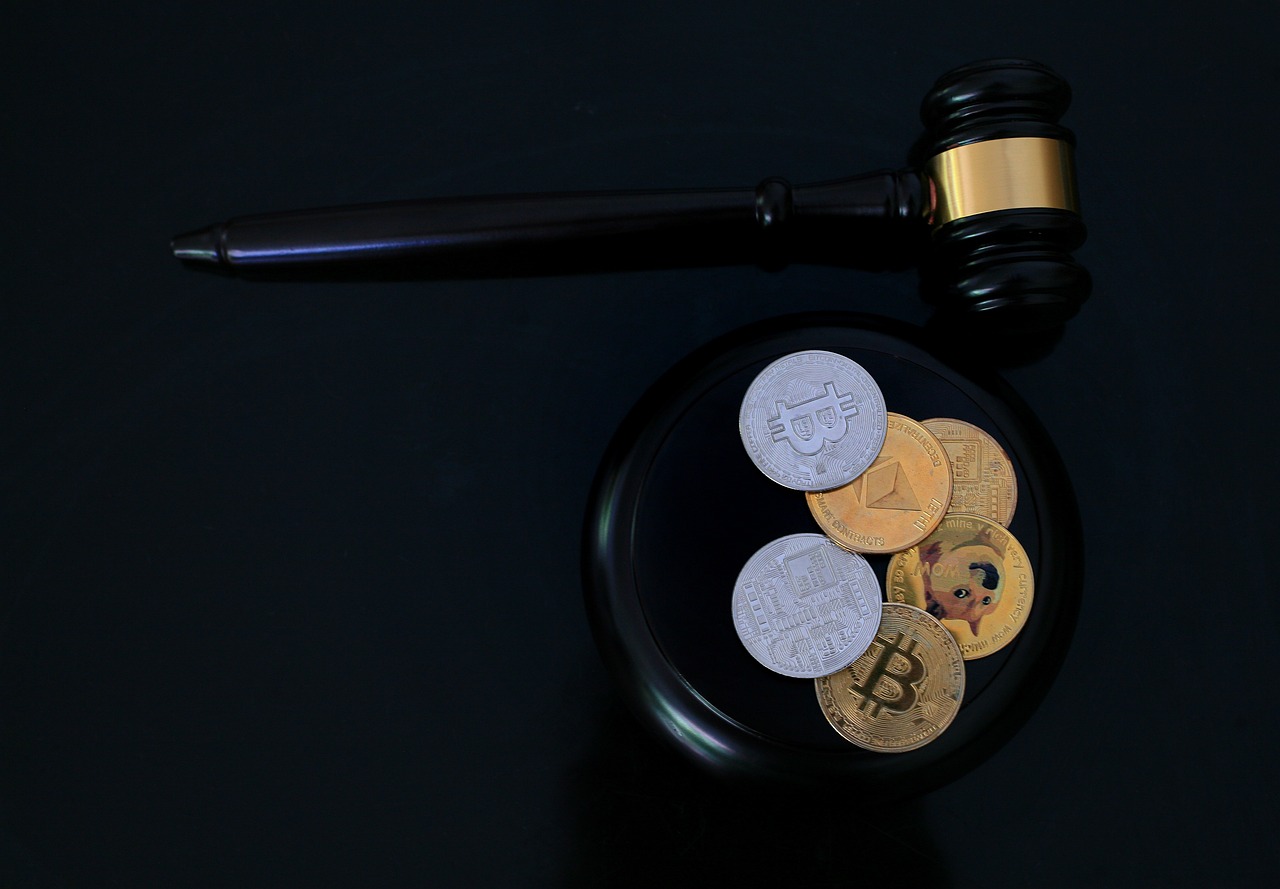The Growing Demand for Crypto Regulatory Compliance
The cryptocurrency landscape is evolving at a breakneck speed, and with that evolution comes an increasing demand for regulatory compliance. Just think about it: a few years ago, Bitcoin was a novelty, a digital coin that intrigued tech enthusiasts and early adopters. Fast forward to today, and cryptocurrencies are becoming a mainstream asset class, attracting not just individual investors but also institutional players. This surge in interest has led to a pressing need for frameworks that ensure trust and stability in the market. So, what does this mean for businesses, investors, and the overall market landscape? Let's dive deeper.
First off, regulatory compliance is not just a buzzword; it's a fundamental pillar that supports the entire crypto ecosystem. It serves to protect investors from potential fraud and ensures that companies are operating within the law. Imagine stepping into a bustling marketplace where every vendor is selling something different, but there's no oversight—chaos would ensue! Regulatory bodies act as the referees in this marketplace, ensuring that everyone plays by the rules, which ultimately fosters a more secure environment for all participants.
As the world becomes more interconnected, the implications of regulatory compliance are becoming even more significant. Businesses that fail to comply with regulations risk not only hefty fines but also damage to their reputation. In an industry where trust is paramount, losing that credibility can be devastating. Investors are becoming increasingly savvy; they want to know that their investments are protected. Hence, the demand for transparency and accountability is higher than ever. Companies that prioritize compliance will not only attract more customers but also position themselves as leaders in the industry.
Moreover, the regulatory landscape is not uniform. Different countries have different rules, and navigating these can be like walking through a maze. This complexity is why understanding the roles of various regulatory bodies is crucial for businesses operating in the cryptocurrency sector. From the Financial Action Task Force (FATF) to the U.S. Securities and Exchange Commission (SEC), these organizations are shaping how cryptocurrencies are regulated globally. Their guidelines and recommendations are not just suggestions; they are becoming essential for businesses that want to thrive in this competitive environment.
In summary, the growing demand for crypto regulatory compliance is not just a trend; it is a necessary evolution in the cryptocurrency space. As more people embrace digital assets, the call for regulations that protect both investors and businesses will only grow louder. By understanding the importance of compliance and the roles of various regulatory bodies, companies can better navigate this complex landscape and position themselves for long-term success.

The Importance of Regulatory Compliance
Regulatory compliance is not just a buzzword; it's a cornerstone for the cryptocurrency market. In a space that thrives on innovation and rapid change, compliance acts as a stabilizing force. It fosters trust among investors and stakeholders, ensuring that businesses operate within established legal frameworks. Think of it like a safety net in a circus act—without it, the whole performance risks falling apart. When investors feel secure, they're more likely to engage with the market, which in turn drives growth and stability.
Moreover, compliance is essential for protecting investors from the myriad of risks associated with the cryptocurrency landscape. The digital currency world can be a wild ride, filled with volatile swings and potential scams. Regulatory compliance helps to mitigate these risks by implementing standards that companies must adhere to, thus creating a safer environment for everyone involved. This is particularly important as the market matures and attracts a broader audience, including those who may not be as tech-savvy or familiar with the intricacies of blockchain technology.
In addition, regulatory compliance can enhance a company's reputation. Firms that prioritize compliance are often viewed as more trustworthy and credible. This can lead to increased customer loyalty and even partnerships with larger corporations that require stringent compliance measures. In a world where reputation can make or break a business, compliance is a vital ingredient for success.
Furthermore, as governments and regulatory bodies around the world continue to develop and refine their approaches to cryptocurrency, staying compliant can offer a competitive edge. Businesses that proactively adopt compliance measures are better positioned to adapt to new regulations and can avoid costly penalties or legal issues down the line. In essence, compliance is not just about avoiding trouble; it's about positioning oneself as a leader in the market.
To summarize, the importance of regulatory compliance in the cryptocurrency sector cannot be overstated. It serves multiple purposes, including:
- Building Trust: Fosters confidence among investors and stakeholders.
- Risk Mitigation: Protects investors from fraud and market volatility.
- Enhancing Reputation: Positions companies as credible and trustworthy.
- Competitive Advantage: Prepares businesses for evolving regulations.
In conclusion, as the cryptocurrency market continues to grow and evolve, the need for regulatory compliance will only increase. Companies that embrace this necessity will not only safeguard their operations but also contribute to the overall health and sustainability of the cryptocurrency ecosystem.

Key Regulatory Bodies and Their Roles
The cryptocurrency landscape is a dynamic and ever-evolving environment, and with this growth comes the necessity for regulatory oversight. Various regulatory bodies worldwide are stepping up to shape the framework for cryptocurrency compliance. Understanding the roles of these institutions is essential for businesses and investors who wish to navigate this complex ecosystem effectively. By establishing clear guidelines and standards, these organizations help foster a sense of security and legitimacy within the market, which is crucial for attracting both institutional and retail investors.
One of the most significant players in this arena is the Financial Action Task Force (FATF). This intergovernmental organization sets international standards aimed at combating money laundering and terrorist financing. The FATF's guidelines significantly influence how cryptocurrencies are regulated across various jurisdictions. For instance, the FATF has made it clear that cryptocurrency exchanges must adhere to specific measures that enhance transparency and mitigate risks associated with illicit activities. This includes implementing Know Your Customer (KYC) protocols and conducting regular audits to ensure compliance with these recommendations.
Another key regulatory body is the U.S. Securities and Exchange Commission (SEC). The SEC plays a pivotal role in regulating securities within the cryptocurrency space, which directly affects how digital assets are classified and traded. The SEC's position on whether certain cryptocurrencies qualify as securities can have far-reaching implications for businesses operating in this sector. This regulatory scrutiny is essential for maintaining market integrity and protecting investors from potential fraud. However, the SEC's approach can sometimes create uncertainty, as many crypto projects are left in limbo awaiting clear classifications.
In addition to these major players, there are numerous other regulatory bodies around the world, each with its own set of rules and guidelines. For example, the European Securities and Markets Authority (ESMA) and the Financial Conduct Authority (FCA) in the UK are also working towards establishing comprehensive regulatory frameworks for cryptocurrencies. These organizations aim to create a level playing field while ensuring that investors are adequately protected. The challenge lies in harmonizing these regulations across different regions, as the lack of a unified approach can lead to confusion and compliance difficulties for businesses operating internationally.
To illustrate the roles of these regulatory bodies, consider the following table that summarizes their key functions:
| Regulatory Body | Primary Role | Key Focus Areas |
|---|---|---|
| Financial Action Task Force (FATF) | Set international standards for AML and CTF | KYC, transparency, risk mitigation |
| U.S. Securities and Exchange Commission (SEC) | Regulate securities in the crypto space | Investor protection, market integrity |
| European Securities and Markets Authority (ESMA) | Ensure investor protection and market stability | Market surveillance, regulatory harmonization |
| Financial Conduct Authority (FCA) | Regulate financial markets in the UK | Consumer protection, financial crime prevention |
As we delve deeper into the complexities of cryptocurrency regulation, it becomes evident that these regulatory bodies are not just enforcers of rules; they are also facilitators of trust. By establishing clear guidelines and fostering collaboration between nations, these organizations help create a safer environment for all participants in the cryptocurrency market. This is not just beneficial for businesses; it also enhances investor confidence, which is essential for the long-term growth and stability of the cryptocurrency ecosystem.
- What is the role of the FATF in cryptocurrency regulation? The FATF provides international standards to combat money laundering and terrorist financing, influencing how cryptocurrencies are regulated globally.
- How does the SEC impact the cryptocurrency market? The SEC regulates securities within the cryptocurrency space, affecting how digital assets are classified and traded, which is crucial for investor protection.
- Why is regulatory compliance important for cryptocurrency businesses? Compliance fosters trust and stability in the market, protecting investors and ensuring that companies operate within legal frameworks.

Financial Action Task Force (FATF)
The is an intergovernmental organization that plays a pivotal role in the global fight against money laundering and terrorist financing. Established in 1989, its primary mission is to develop policies that protect the integrity of the international financial system. As cryptocurrencies have surged in popularity, the FATF has recognized the need to address the unique challenges posed by these digital assets. With its international standards, the FATF aims to create a cohesive framework that countries can adopt, ensuring that cryptocurrencies are not exploited for illicit activities.
One of the key aspects of the FATF's influence is its recommendations for cryptocurrency exchanges. These guidelines emphasize the importance of transparency and accountability in operations. For instance, exchanges are encouraged to implement robust Know Your Customer (KYC) protocols and to monitor transactions for suspicious activity. By adhering to these recommendations, exchanges can not only comply with regulations but also build trust with their users. This trust is essential in a market often viewed with skepticism due to its association with anonymity and fraud.
Moreover, the FATF's guidelines have a ripple effect on global regulations. Countries around the world look to the FATF for direction, often adjusting their own laws to align with its recommendations. This has led to a more standardized approach to cryptocurrency regulation, although the pace and extent of adoption vary significantly from one jurisdiction to another. For instance, some countries have embraced the FATF's recommendations wholeheartedly, while others have been slower to adapt, creating a patchwork of regulations that can be confusing for businesses operating internationally.
The FATF's influence is not just limited to formal regulations; it also shapes the conversation around cryptocurrency compliance. As the organization continues to refine its guidelines, it encourages ongoing dialogue among stakeholders, including governments, financial institutions, and cryptocurrency businesses. This collaborative approach is vital for creating a regulatory environment that not only combats illicit activities but also fosters innovation within the crypto space.
In conclusion, the FATF is a cornerstone of the regulatory framework for cryptocurrencies. Its efforts to combat money laundering and terrorist financing are critical for the legitimacy of the cryptocurrency market. As businesses navigate this complex landscape, understanding the FATF's role and recommendations will be essential for achieving compliance and building a sustainable future in the world of digital assets.
- What is the FATF?
The FATF is an international organization that develops policies to combat money laundering and terrorist financing, focusing on creating standards for countries to follow. - How does the FATF influence cryptocurrency regulations?
The FATF sets guidelines that countries adopt to regulate cryptocurrency exchanges, ensuring they implement measures like KYC and transaction monitoring. - Why is regulatory compliance important in the cryptocurrency market?
Regulatory compliance fosters trust among investors, protects against fraud, and helps businesses operate within legal frameworks.

Recommendations for Cryptocurrency Exchanges
In the rapidly evolving world of cryptocurrency, exchanges play a pivotal role in facilitating transactions and providing a platform for investors. However, with great power comes great responsibility. To enhance transparency and mitigate risks associated with illicit activities, the Financial Action Task Force (FATF) has laid out several recommendations specifically tailored for cryptocurrency exchanges. These guidelines are not just regulatory checkboxes; they are essential for building trust and ensuring the long-term sustainability of the crypto market.
First and foremost, exchanges should implement robust customer due diligence (CDD) measures. This involves verifying the identities of their users, which can include collecting personal information and conducting background checks. By doing so, exchanges can prevent fraudulent activities and ensure that they are not inadvertently facilitating money laundering or terrorist financing. Think of it like a bouncer at a nightclub; they need to check IDs to keep the party safe and enjoyable for everyone.
Moreover, exchanges are encouraged to maintain comprehensive records of transactions and customer interactions. This data not only aids in compliance with regulatory requirements but also serves as a valuable resource for internal audits and investigations. Keeping meticulous records is akin to maintaining a diary; it helps keep track of events and can be referred back to when needed. The FATF recommends that these records be kept for a minimum of five years, allowing for thorough scrutiny if required by regulatory authorities.
Another critical recommendation is the implementation of transaction monitoring systems. These systems can help identify suspicious activities in real-time, enabling exchanges to act swiftly when potential risks are detected. Just as a smoke detector alerts you to a fire, transaction monitoring acts as an early warning system, allowing exchanges to mitigate risks before they escalate into significant issues.
Furthermore, exchanges should consider establishing a compliance officer position within their organization. This individual would be responsible for ensuring that the exchange adheres to all regulatory requirements and industry best practices. Having a dedicated compliance officer is like having a captain on a ship; they steer the crew towards safety and navigate through turbulent waters.
Lastly, collaboration with law enforcement and regulatory bodies is essential. By fostering open lines of communication, exchanges can better understand the regulatory landscape and receive guidance on compliance matters. This partnership can also help in addressing any potential threats to the integrity of the market. Think of it as a team sport; working together increases the chances of success and ensures that everyone is on the same page.
In summary, by following these recommendations, cryptocurrency exchanges can not only enhance their compliance efforts but also contribute to a safer and more trustworthy crypto ecosystem. As the regulatory landscape continues to evolve, staying ahead of the curve will be crucial for exchanges aiming to thrive in this competitive environment.
- What is the importance of compliance for cryptocurrency exchanges?
Compliance ensures that exchanges operate within legal frameworks, protecting both the business and its users from potential legal issues. - How can exchanges improve their customer due diligence?
Exchanges can enhance CDD by implementing identity verification processes and conducting background checks on users. - What role does transaction monitoring play?
Transaction monitoring helps identify suspicious activities in real-time, allowing exchanges to act quickly to mitigate risks. - Why is a compliance officer necessary?
A compliance officer ensures that the exchange adheres to regulations and best practices, providing guidance and oversight. - How can exchanges collaborate with regulatory bodies?
Exchanges can maintain open communication with regulatory authorities to stay informed about compliance requirements and industry changes.

Impact on Global Regulations
The impact of the Financial Action Task Force (FATF) on global regulations cannot be overstated. As countries scramble to adapt their legal frameworks to accommodate the burgeoning cryptocurrency market, the FATF's recommendations serve as a guiding beacon. These guidelines compel nations to implement stringent measures aimed at combating money laundering and terrorist financing, which are significant concerns in the crypto realm. By establishing a baseline for regulatory compliance, the FATF has effectively encouraged countries to harmonize their approaches, leading to a more cohesive global strategy.
As nations respond to the FATF's influence, we see a ripple effect across various jurisdictions. Countries that were once hesitant to embrace cryptocurrency are now recognizing the importance of a structured regulatory environment. For instance, nations in the European Union are working towards a unified regulatory framework, which aims to provide clarity and foster innovation while ensuring investor protection. This shift not only enhances the legitimacy of cryptocurrencies but also attracts institutional investors who were previously wary of entering such a volatile market.
Moreover, the FATF's recommendations have prompted a wave of legislative changes worldwide, with many countries revising their existing laws or introducing new ones specifically tailored for digital assets. This transformation is crucial for establishing a legal foundation that can support the growing cryptocurrency ecosystem. As regulations become more standardized, businesses can operate with greater confidence, knowing that they are adhering to internationally accepted practices.
However, this global regulatory alignment is not without its challenges. Different countries have varying degrees of willingness to adopt the FATF's guidelines, which can lead to inconsistencies in enforcement. For example, while some jurisdictions may quickly implement robust compliance measures, others may lag behind, creating a patchwork of regulations that can complicate cross-border transactions. This inconsistency can stifle innovation and create barriers for businesses looking to expand internationally.
To illustrate the varying responses from different regions, consider the following table:
| Region | Regulatory Response | Level of Compliance |
|---|---|---|
| North America | Strong focus on securities regulation | High |
| Europe | Developing a unified regulatory framework | Moderate |
| Asia | Mixed approaches; some countries embrace crypto, others restrict | Varied |
| Middle East | Emerging regulations; focus on innovation | Low to Moderate |
As we look to the future, the FATF's ongoing influence will likely continue to shape the regulatory landscape of cryptocurrencies globally. Countries that proactively align with these standards will not only enhance their reputations but also create a more secure environment for both businesses and investors. This evolution is crucial for the sustainability of the cryptocurrency market, as it fosters trust and encourages broader adoption.
- What is the FATF and why is it important for cryptocurrency? The Financial Action Task Force is an intergovernmental organization that sets international standards to combat money laundering and terrorist financing, significantly impacting how cryptocurrencies are regulated globally.
- How do global regulations affect cryptocurrency businesses? Global regulations create a structured environment that helps businesses operate legally, ensuring they meet compliance requirements and protecting them from potential legal issues.
- Are all countries following the FATF guidelines? No, while many countries are adapting their regulations in line with FATF recommendations, there are still significant variances in how different jurisdictions implement these guidelines.
- What challenges do businesses face in achieving compliance? Businesses often face challenges such as ambiguous regulations, technological barriers, and the financial burden of implementing compliance measures.

U.S. Securities and Exchange Commission (SEC)
The is a pivotal entity in the realm of cryptocurrency regulation. Established to protect investors, maintain fair and efficient markets, and facilitate capital formation, the SEC has increasingly turned its focus towards the digital asset landscape. As cryptocurrencies gain traction, they often blur the lines between traditional securities and digital currencies, creating a complex regulatory environment. This situation raises a fundamental question: how does the SEC define and regulate these assets?
At its core, the SEC's mission is to ensure that investors are provided with essential information about the securities they purchase. This includes understanding the risks associated with investing in cryptocurrencies, which can be notoriously volatile. The SEC has taken a proactive stance in classifying certain cryptocurrencies as securities, which means they fall under the same regulatory scrutiny as stocks and bonds. This classification has far-reaching implications for companies wishing to launch Initial Coin Offerings (ICOs) or trade digital assets.
In recent years, the SEC has issued several statements and guidelines to clarify its position on cryptocurrencies. For instance, the SEC has emphasized that if a digital asset is marketed as an investment opportunity with the expectation of profit derived from the efforts of others, it may be classified as a security. This is based on the Howey Test, a legal framework used to determine whether certain transactions qualify as investment contracts. The implications of this are significant, as it means that companies must comply with rigorous reporting and registration requirements.
Moreover, the SEC has been known to take enforcement actions against companies that fail to adhere to these regulations. For example, numerous ICOs have faced penalties for not registering their offerings, leading to substantial fines and, in some cases, the shutdown of operations. This enforcement approach not only serves as a warning to potential violators but also aims to protect investors from fraudulent schemes that have unfortunately proliferated in the crypto space.
In addition to enforcement, the SEC is also engaged in ongoing dialogue with stakeholders in the cryptocurrency industry. By hosting public forums and soliciting input from various parties, the SEC aims to strike a balance between fostering innovation and ensuring investor protection. This collaborative approach is essential in an industry characterized by rapid technological advancements and evolving business models.
As the SEC continues to navigate the complexities of cryptocurrency regulation, it is likely that we will see further developments in the coming years. The challenge lies in creating a regulatory framework that not only safeguards investors but also encourages innovation in the burgeoning cryptocurrency market. In this ever-changing landscape, businesses must remain vigilant and adaptable, ensuring they stay compliant with SEC regulations while also seizing opportunities for growth.
- What is the role of the SEC in cryptocurrency regulation? The SEC regulates securities, which can include certain cryptocurrencies, to protect investors and ensure fair markets.
- How does the SEC determine if a cryptocurrency is a security? The SEC uses the Howey Test to assess whether a digital asset meets the criteria of an investment contract.
- What are the consequences for non-compliance with SEC regulations? Companies that fail to comply may face enforcement actions, including fines and penalties, and may be forced to cease operations.

Challenges in Achieving Compliance
This article explores the increasing need for regulatory compliance in the cryptocurrency sector, examining its implications for businesses, investors, and the overall market landscape.
Regulatory compliance is crucial for fostering trust and stability in the cryptocurrency market. It helps protect investors and ensures that companies operate within legal frameworks.
Various regulatory bodies worldwide are shaping the landscape of cryptocurrency compliance. Understanding their roles is essential for businesses navigating this complex environment.
The FATF sets international standards to combat money laundering and terrorist financing. Its guidelines impact how cryptocurrencies are regulated globally.
The FATF recommends specific measures for cryptocurrency exchanges to enhance transparency and mitigate risks associated with illicit activities.
The FATF's influence extends to countries worldwide, prompting them to adapt their regulations in response to the evolving cryptocurrency landscape.
The SEC plays a critical role in regulating securities within the cryptocurrency space, affecting how digital assets are classified and traded.
Despite the need for compliance, many cryptocurrency businesses face significant challenges, including ambiguous regulations and the fast-paced nature of the crypto market. One of the most pressing issues is the ambiguity in regulations. The lack of clear guidelines can lead to confusion for businesses trying to operate within legal boundaries. Imagine trying to navigate a maze without a map; that's how many companies feel when they attempt to decipher the existing regulatory landscape. This ambiguity can result in unintentional non-compliance, which can be detrimental to a business's reputation and financial standing.
Another challenge is the technological barriers that come with implementing compliance measures. Compliance often requires advanced technology to monitor transactions, ensure data security, and maintain accurate records. For smaller companies in the crypto sector, this can be a significant financial burden. They may struggle to invest in the necessary technology, which can lead to gaps in compliance. Just like a small fish trying to swim against a strong current, these businesses often find themselves at a disadvantage compared to larger, more established firms that can easily absorb the costs associated with compliance.
Additionally, the rapidly changing nature of the cryptocurrency market poses a unique challenge. Regulations are constantly evolving, and businesses must keep up with these changes to remain compliant. This can feel like trying to hit a moving target, making it incredibly difficult for companies to establish stable compliance processes. The stakes are high; failing to adapt quickly enough can expose businesses to legal risks and financial penalties.
In summary, the challenges in achieving compliance in the cryptocurrency sector are multifaceted. They range from regulatory ambiguities and technological hurdles to the fast-paced nature of the market itself. Addressing these challenges is essential for businesses that want to thrive in this dynamic environment.
As the cryptocurrency market continues to evolve, so too will the regulations governing it. Anticipating future trends is essential for businesses aiming to stay compliant.
In response to the growing demand for compliance, regulatory bodies are likely to enhance collaboration, leading to more standardized regulations across borders.
Future regulations may increasingly prioritize consumer protection, ensuring that investors are safeguarded against fraud and other risks associated with cryptocurrencies.
- What is regulatory compliance in cryptocurrency? Regulatory compliance in cryptocurrency refers to the adherence to laws and regulations that govern the operation of cryptocurrency businesses to protect investors and ensure market integrity.
- Why is compliance important for cryptocurrency businesses? Compliance is crucial as it fosters trust among investors, helps prevent illegal activities, and ensures that businesses can operate legally within their jurisdictions.
- What challenges do cryptocurrency businesses face in achieving compliance? Challenges include ambiguous regulations, technological barriers, and the fast-paced nature of the crypto market, which can complicate compliance efforts.

Ambiguity in Regulations
The world of cryptocurrency is a thrilling ride, filled with opportunities and risks alike. Yet, one of the most significant hurdles that businesses face today is the . Imagine trying to navigate a dense fog without a map—this is how many companies feel when they attempt to comply with ever-changing laws surrounding digital currencies. The lack of clear guidelines creates a landscape where uncertainty reigns, leading to confusion and hesitation among businesses eager to innovate and grow.
Many entrepreneurs find themselves caught in a web of conflicting information. For instance, while one country may embrace cryptocurrencies with open arms, another may impose strict regulations or even outright bans. This inconsistency can leave businesses unsure about how to operate legally, risking hefty fines or even criminal charges. The result? A chilling effect on innovation where companies may choose to play it safe rather than explore the full potential of blockchain technology.
Moreover, the rapid evolution of the cryptocurrency market adds another layer of complexity. Regulations that may have made sense six months ago could be outdated today. This fast-paced environment means businesses must constantly adapt, often without clear guidance from regulatory bodies. As a result, many companies invest time and resources into compliance measures that may soon become irrelevant, leading to wasted efforts and financial strain.
To illustrate this challenge, consider the following table that summarizes the different regulatory approaches taken by various countries:
| Country | Regulatory Approach | Impact on Businesses |
|---|---|---|
| United States | Fragmented; SEC and CFTC oversight | Uncertainty in asset classification |
| China | Strict bans on ICOs and exchanges | Exodus of crypto companies |
| Switzerland | Proactive; clear guidelines | Attracts crypto startups |
| Japan | Regulated; requires licenses | Increased trust among users |
This table highlights how different regulatory environments can significantly affect the operations of cryptocurrency businesses. In countries with stringent regulations, it becomes challenging for companies to thrive, while more lenient environments can foster growth and innovation.
Ultimately, the ambiguity in regulations not only stifles business growth but also undermines consumer confidence. When potential investors see companies struggling to comply with unclear laws, they may hesitate to enter the market, fearing potential losses. This cycle of uncertainty can create a barrier to entry for new players and hinder the overall growth of the cryptocurrency ecosystem.
As the industry matures, it is crucial for regulatory bodies to step up and provide clearer guidelines that can help businesses navigate this complex landscape. Until then, companies must remain vigilant, continuously educating themselves about the legal landscape and adapting their strategies accordingly. The road ahead may be foggy, but with the right tools and knowledge, businesses can find their way through the haze.
- What is regulatory compliance in cryptocurrency?
Regulatory compliance refers to the adherence of cryptocurrency businesses to laws and regulations set forth by governing bodies to ensure legal and ethical operations. - Why is there ambiguity in cryptocurrency regulations?
The rapid evolution of the market, combined with varying approaches from different countries, leads to inconsistent and often unclear regulatory guidelines. - How can businesses navigate regulatory challenges?
Staying informed about changes in regulations, seeking legal advice, and investing in compliance technologies can help businesses navigate these challenges.

Technological Barriers
The world of cryptocurrency is like a thrilling rollercoaster ride, filled with twists, turns, and unexpected drops. However, for many businesses trying to navigate this exhilarating landscape, can feel like a massive roadblock. As the demand for regulatory compliance increases, companies often find themselves grappling with the need to implement sophisticated technological solutions. But here's the kicker: these solutions can come with hefty price tags that many smaller businesses simply can't afford.
Imagine you’re trying to build a sturdy bridge across a turbulent river. You need advanced materials and engineering expertise, but the cost of construction is daunting. Similarly, cryptocurrency businesses must invest in technologies like anti-money laundering (AML) software, know-your-customer (KYC) protocols, and blockchain analytics tools to meet compliance requirements. This can be particularly challenging for startups and smaller firms that operate on tight budgets.
Moreover, the rapid pace of technological advancement in the crypto space means that what works today might not be sufficient tomorrow. Companies are often left scrambling to keep up with new regulations and the tools required to comply with them. For instance, a small exchange might implement a KYC solution only to find out that it’s outdated within a few months, necessitating another investment in technology. This constant need for upgrades can drain resources and hinder growth.
In addition to financial constraints, there’s also the issue of technical expertise. Many smaller companies may not have the in-house talent necessary to effectively implement and manage these complex systems. This lack of expertise can lead to improper use of technology, increasing the risk of non-compliance and potentially severe penalties. The combination of high costs and the need for specialized knowledge creates a perfect storm of challenges for businesses trying to stay on the right side of the law.
To illustrate the technological challenges faced by cryptocurrency businesses, let’s take a look at a simple comparison in the table below:
| Challenge | Description | Impact on Business |
|---|---|---|
| High Costs | Investment in compliance technology can be prohibitive for small firms. | Limits growth and innovation. |
| Rapid Changes | Technological solutions can quickly become outdated. | Increases operational costs and compliance risks. |
| Lack of Expertise | Small firms may struggle to find qualified personnel. | Can lead to improper implementation and higher risks of non-compliance. |
In conclusion, while the path to regulatory compliance in the cryptocurrency sector is essential for building trust and stability, the that businesses face can be daunting. As the landscape continues to evolve, it’s crucial for companies to find innovative ways to overcome these challenges, whether through partnerships, outsourcing, or leveraging emerging technologies that can streamline compliance processes without breaking the bank.
- What are the main technological barriers to compliance in the cryptocurrency sector? The main barriers include high costs of compliance technology, rapid changes in technology, and a lack of in-house expertise.
- How can small businesses overcome these technological challenges? Small businesses can consider partnerships, outsourcing compliance functions, or leveraging cost-effective technology solutions.
- Why is regulatory compliance important for cryptocurrency businesses? Regulatory compliance fosters trust, protects investors, and ensures that businesses operate within legal frameworks.

Future Trends in Crypto Compliance
The landscape of cryptocurrency compliance is not static; it's a dynamic environment that continuously evolves alongside technological advancements and market demands. As we look toward the future, several key trends are emerging that will shape how businesses navigate the complex world of crypto regulations. One significant trend is the increased global cooperation among regulatory bodies. In an interconnected world, the need for standardized regulations across borders is becoming more apparent. Countries are beginning to recognize that a unified approach can help combat issues like money laundering and fraud more effectively. This collaborative spirit among regulators will likely lead to a more cohesive framework, making it easier for businesses to comply with regulations regardless of where they operate.
Another important trend is the focus on consumer protection. As cryptocurrencies gain traction among mainstream investors, regulatory bodies are likely to prioritize measures that safeguard consumers against potential risks. This could involve stricter rules around transparency and disclosure, ensuring that investors have access to clear information regarding the assets they are investing in. For instance, we might see regulations that require cryptocurrency exchanges to provide detailed reports on transaction fees, security measures, and the risks associated with trading specific digital assets. Such transparency could foster greater trust in the market, ultimately benefiting both businesses and investors.
Additionally, the rise of decentralized finance (DeFi) platforms presents both opportunities and challenges for compliance. As these platforms operate outside traditional financial systems, regulators are grappling with how to apply existing laws to this new paradigm. Future regulations may need to address the unique characteristics of DeFi, such as smart contracts and automated governance, to ensure that they are not exploited for illicit activities. This could lead to the development of tailored compliance frameworks specifically designed for DeFi projects, allowing them to thrive while maintaining necessary oversight.
Moreover, technological advancements are expected to play a crucial role in shaping the future of crypto compliance. As the market becomes more sophisticated, so too will the tools available for ensuring compliance. Companies may leverage innovative technologies like artificial intelligence and blockchain analytics to enhance their compliance efforts. These technologies can help identify suspicious activities in real-time, making it easier for businesses to adhere to regulations and protect their customers. However, this also means that smaller companies may face challenges in adopting such technologies due to financial constraints, potentially widening the gap between larger firms and startups in the crypto space.
In conclusion, the future of cryptocurrency compliance will be characterized by increased collaboration among regulators, a strong emphasis on consumer protection, and the need to adapt to the unique challenges posed by emerging technologies and financial models. Businesses operating in the crypto space must stay informed and agile, ready to adapt to these trends to ensure compliance and foster a secure environment for their users.
- What is the significance of regulatory compliance in the cryptocurrency sector?
Regulatory compliance is essential for building trust in the cryptocurrency market, protecting investors, and ensuring that businesses operate within legal boundaries. - How do regulatory bodies impact cryptocurrency businesses?
Regulatory bodies establish guidelines and standards that cryptocurrency businesses must follow to operate legally, which can affect everything from how digital assets are classified to how exchanges operate. - What challenges do crypto businesses face in achieving compliance?
Many crypto businesses struggle with ambiguous regulations, technological barriers, and the fast-paced nature of the market, making compliance a daunting task. - What future trends should businesses watch for in crypto compliance?
Businesses should pay attention to increased global cooperation among regulators, a focus on consumer protection, and the evolution of compliance frameworks tailored for decentralized finance.

Increased Global Cooperation
The landscape of cryptocurrency regulation is evolving rapidly, and one of the most promising trends is the among regulatory bodies. As the cryptocurrency market transcends borders, the need for a cohesive regulatory framework becomes more apparent. Imagine trying to navigate a maze with constantly shifting walls; that’s what it feels like for businesses operating in the crypto space without standardized regulations. The collaborative efforts among international regulatory agencies aim to create a more predictable environment, making it easier for companies to comply with laws and for investors to feel secure.
In recent years, we’ve seen significant strides toward harmonizing regulations across nations. This cooperation is not just about sharing information; it’s about developing a unified approach to tackle issues like money laundering, fraud, and consumer protection. For instance, the Financial Action Task Force (FATF) has been pivotal in encouraging countries to adopt similar guidelines, which enhances transparency and accountability in the cryptocurrency sector. As more countries align their regulations with FATF recommendations, businesses can operate with greater confidence, knowing that they are adhering to internationally recognized standards.
However, this increased cooperation also brings challenges. Different countries have varying levels of technological infrastructure and regulatory priorities, which can lead to inconsistencies. For example, while some regions may prioritize strict compliance measures, others might focus more on innovation and growth. This disparity can create a tug-of-war effect, where companies may feel pressured to choose between adhering to strict regulations or pursuing aggressive growth strategies. Nevertheless, the overall trend points towards a future where global cooperation will likely lead to more robust and comprehensive regulations that benefit all stakeholders.
As we look ahead, it’s essential for businesses to stay informed about these developments. Engaging with global regulatory discussions and participating in forums can provide valuable insights into emerging trends and best practices. The more businesses understand the regulatory landscape, the better equipped they will be to navigate it successfully. In this rapidly changing environment, those who adapt quickly will not only survive but thrive. The future of cryptocurrency compliance hinges on this collective effort, and it’s an exciting time to be part of this dynamic industry.
- What is the role of global cooperation in cryptocurrency regulation?
Global cooperation helps create standardized regulations, making it easier for businesses to comply and for investors to feel secure. - How does the FATF influence cryptocurrency regulations?
The FATF sets international standards that encourage countries to adopt similar guidelines, enhancing transparency and accountability. - What challenges arise from increased global cooperation?
Different regulatory priorities and technological infrastructures can create inconsistencies, making compliance a complex task for businesses. - How can businesses stay informed about regulatory changes?
Engaging with global regulatory discussions and participating in forums can provide valuable insights into emerging trends and best practices.

Focus on Consumer Protection
The cryptocurrency landscape is rapidly evolving, and with it, the need for robust consumer protection measures is becoming increasingly apparent. As more individuals dive into the world of digital assets, the potential risks associated with fraud, hacking, and misleading information loom larger than ever. This is where regulatory bodies are stepping up to the plate, aiming to create a safer environment for investors. Think of it like a safety net that catches you before you hit the ground—regulations are designed to cushion the fall for unsuspecting investors who might otherwise plunge into the depths of scams and financial loss.
One of the most pressing issues is the prevalence of fraudulent schemes. From Ponzi schemes to phishing attacks, the crypto space has seen its fair share of scams that target unsuspecting investors. Regulatory agencies are now focusing on implementing rules that require cryptocurrency exchanges and platforms to enhance their security protocols. By mandating stringent verification processes and secure transaction systems, these regulations act as a shield, protecting consumers from potential threats. Just as you wouldn’t walk into a bank without knowing it’s secure, consumers need to feel confident in the platforms they use to trade cryptocurrencies.
Furthermore, regulatory bodies are emphasizing the importance of transparency. Imagine you’re buying a car; you’d want to know its history, right? Similarly, when investing in cryptocurrencies, consumers deserve to have clear and accessible information about the assets they are purchasing. Regulations are being developed that require exchanges to disclose vital information about the cryptocurrencies they list, including their volatility, historical performance, and potential risks. This transparency not only empowers consumers to make informed decisions but also fosters a culture of accountability within the industry.
In addition to transparency and security, there’s a growing trend towards enhancing educational resources for consumers. Regulatory bodies recognize that knowledge is power, and they are pushing for initiatives that educate investors about the risks and rewards of cryptocurrency investments. This could include mandatory educational programs for new investors or informative resources available on trading platforms. By equipping consumers with the knowledge they need, regulatory compliance can help mitigate risks and promote responsible investing.
To illustrate the potential impact of these consumer protection measures, consider the following table that highlights key areas of focus:
| Area of Focus | Description |
|---|---|
| Fraud Prevention | Implementing security protocols to protect consumers from scams and hacking attempts. |
| Transparency | Mandating clear disclosure of information regarding cryptocurrencies and exchanges. |
| Education | Providing resources and programs to educate consumers about cryptocurrency investments. |
As we look to the future, it’s clear that the focus on consumer protection will continue to evolve alongside the cryptocurrency market. Regulatory bodies are likely to adopt more comprehensive frameworks that not only safeguard investors but also encourage innovation within the industry. The challenge lies in finding the right balance between protecting consumers and allowing the market to flourish. Just like a gardener tends to their plants, regulators must nurture the crypto ecosystem while ensuring that consumers are shielded from harm.
- What are the main risks associated with cryptocurrency investments? The primary risks include market volatility, fraud, and regulatory uncertainty.
- How do regulations improve consumer protection in crypto? Regulations enhance security, promote transparency, and provide educational resources for investors.
- Will regulatory compliance stifle innovation in the crypto space? While some argue it may slow down innovation, well-structured regulations can actually foster a safer environment for new developments.
Frequently Asked Questions
- What is regulatory compliance in the cryptocurrency sector?
Regulatory compliance in the cryptocurrency sector refers to adhering to laws and regulations set by governing bodies to ensure that crypto-related activities are conducted legally and ethically. This compliance is vital for building trust among investors and maintaining the stability of the market.
- Why is regulatory compliance important for cryptocurrency businesses?
Regulatory compliance is crucial for cryptocurrency businesses as it helps protect investors from fraud and ensures that companies operate within legal frameworks. It also fosters a sense of legitimacy in the market, which can attract more users and investors.
- Who are the key regulatory bodies overseeing cryptocurrency compliance?
Several key regulatory bodies, including the Financial Action Task Force (FATF) and the U.S. Securities and Exchange Commission (SEC), play significant roles in overseeing cryptocurrency compliance. These organizations set the standards and guidelines that companies must follow to ensure they operate legally.
- What challenges do cryptocurrency businesses face in achieving compliance?
Cryptocurrency businesses often face challenges such as ambiguous regulations, which can lead to confusion about what is required for compliance. Additionally, implementing compliance measures may require advanced technology, posing a financial burden, especially for smaller companies.
- How is the landscape of cryptocurrency regulation expected to change in the future?
In the future, we can expect increased global cooperation among regulatory bodies, leading to more standardized regulations across borders. There will also likely be a greater focus on consumer protection, ensuring that investors are safeguarded against fraud and other risks associated with cryptocurrencies.
- What steps can cryptocurrency businesses take to ensure compliance?
To ensure compliance, cryptocurrency businesses should stay informed about the latest regulations, invest in compliance technology, and consider consulting legal experts. Establishing robust internal policies and training staff on compliance matters can also help mitigate risks.
- How do regulatory changes impact cryptocurrency investors?
Regulatory changes can significantly impact cryptocurrency investors by affecting the legality and availability of certain digital assets. Compliance measures can enhance investor protection, but they may also lead to increased costs for businesses, which could be passed on to consumers.



















